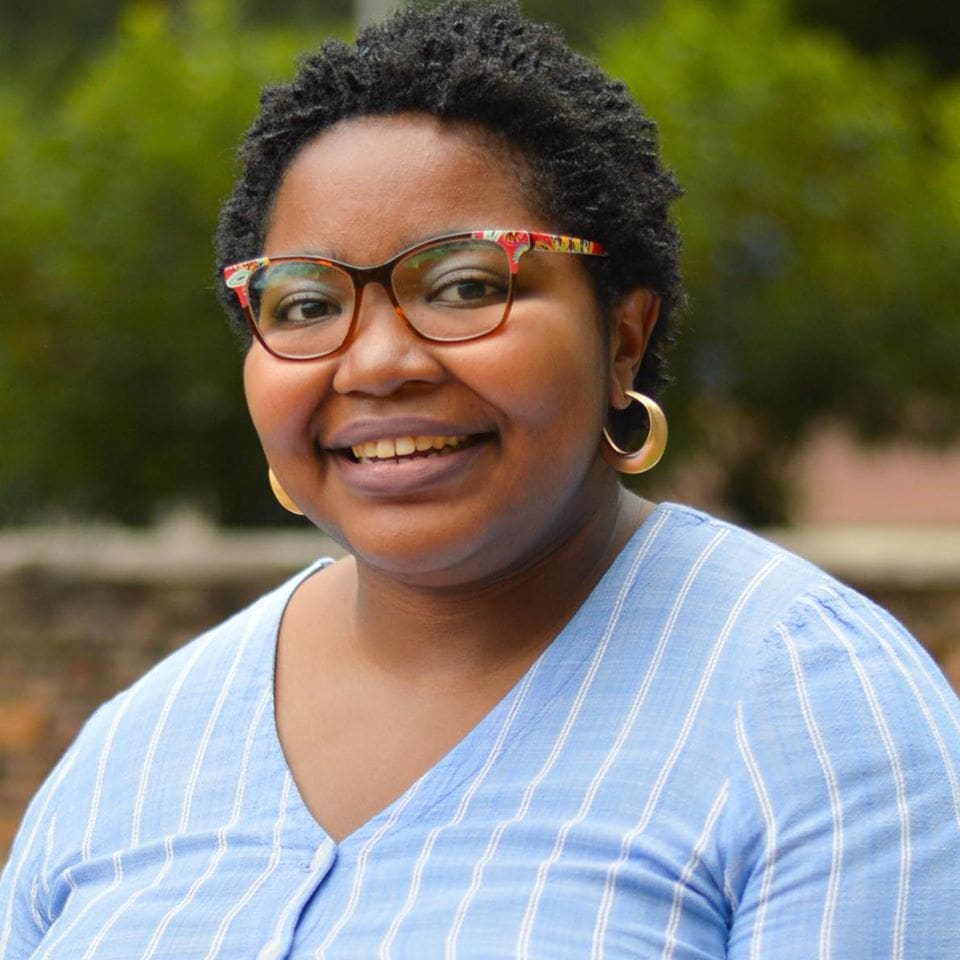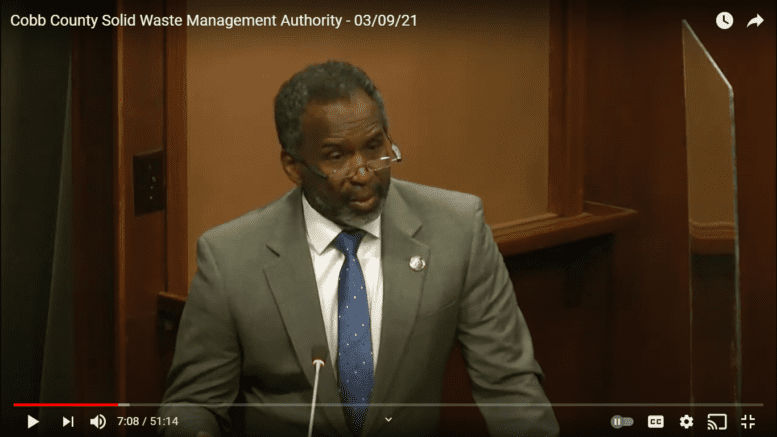The Cobb County Solid Waste Management Authority heard reports from Green For Life, WestRock, TAG Grinding Services and Keep Cobb Beautiful at its annual meeting last Tuesday, March 9.
The directors of the authority are the district commissioners and the BOC chairwoman, and the meeting was held immediately before the regular Board of Commissioners meeting..
The authority was established through a 1994 resolution as a way of promoting environmentally efficient storage of trash and/or garbage in Cobb County.
GFL (Green for Life) collects the county’s solid wastes at transfer facilities. Recyclable items are included among the waste GFL deals with.
GFL General Manager Brandie Edwards said that despite COVID-19, the number of items being recycled has not differed greatly from 2019 to 2020. In fact, a higher ton of metals were recycled last year than in 2019.
But used oil and tires were among the items that were recycled less from 2019 through 2020.
“COVID just put a damper on residents coming in to use the facility for a while,” Edwards said.
However, Edwards said that GFL has seen higher waste pickup numbers coming to the transfer stations from residential areas.
Since October 2020, GFL has replaced Advanced Disposal at the county transfer stations.
Commissioner JoAnn Birrell asked how the ADS contract was given to GFL with no bid.
Edwards said that in April 2019, WM acquired ADS’ stocks. The two companies merged and now ADS is a subsidiary of WM.
The Department of Justice would not allow WM to purchase all of ADS’ waste sites because both are large companies, Edwards said. As a result, WM had to sell some sites to a different company.
GFL ended up purchasing the sites WM left behind.
ADS paid $69,410.07 to the county before GFL took over, Edwards said. This is down from $85,662 in 2019.
The GFL general manager attributed this loss to a smaller waste volume when ADS no longer operated the site.
Despite some losses, Edwards said she only sees improvements to come for GFL in 2021, as GFL plans to expand its reach in Cobb.
WestRock Company is a fiber-based packaging company that has 19 recycling facilities across 11 states. The company also handles glass recycling.
In Cobb specifically, WestRock is host to community dropoff stations where residents can drop off their glass, recyclables, and other solid wastes.
WestRock Director of Operations Nate Nelson said that within the last year, Cobb residents have increasingly used the community recycling drop-off box.
Nelson said the company usually clears out glass bins two to three times per day but in 2020 that number went up to eight times.
Nelson also said that WestRock has increasingly been cleaning up debris and other hazards as traffic into Cobb increases. A cleanup crew patrols the bins.
WestRock’s payments to Cobb have experienced an uptick between 2019 and 2020, from $284,791.65 to $328,045.86, respectively.
Cobb Public Services Agency Director Bill Tanks told the authority that adjustments the county has made with TAG Grinding Services can be a great way for Cobb County to take in more revenue.
TAG is a vegetative waste company, meaning that it deals with yard waste.
Cobb residents can go to an open-air area run by TAG to get rid of trees and yard debris like leaves and vines.
Tanks said that the county started a new contract with TAG and that the county and company have negotiated an increase of a portion of general gross revenues to 10 percent.
The increase is because TAG wants to bring in dirt in addition to the tree and vegetative waste they already handle.
From 2018 through 2020, TAG’s monthly income and number of customers spiked, Tanks said.
In 2020, TAG paid 7.5 percent of its revenue to Cobb County. That number is $140,893.79. Cobb will also receive 10 percent of TAG’s dirt revenues.
Tanks then proceeded to show the first check TAG has given the county.
Cobb made $3,152.50 from TAG’s dirt pit. TAG paid the county on Wednesday, March 3.
Lastly, Kimberly White, the executive director of the award-winning non-profit organization Keep Cobb Beautiful, presented KCB’s findings to the board.
KCB is affiliated with Keep America Beautiful and a member of the Keep Georgia Beautiful Foundation. The non-profit encourages the useful and efficient handling of waste among everyday people.
White said that Georgia is among the states with a littering issue.
According to KCB’s litter index score chart, from 2018 through last year, litter scores have increased in Cobb County.
To counteract this, KCB has initiated a litter prevention plan.
KCB will take part in the Great American Cleanup that starts this month and goes until June.
KCB will also host the Cobb Clean Sweep, where Adopt-a-Mile groups will pick up litter.
White said KCB will be expanding the Adopt-a-Mile program.
Part of the expansion is taking proactive measures at Adopt-a-Mile locations that have “the most egregious litter uptake,” White said.
A sign will be placed telling residents that a surveillance camera is keeping track of litter dumped.
White also said that with regard to KCB’s Christmas tree recycling event, KCB collected fewer trees last year than it normally does.
Normally, KCB collects around 19,000 trees from residents but the past year has only brought 11,545 trees.
The pandemic also caused KCB’s medication disposal and community recycling events to be canceled in spring last year but they were hosted last fall.
The county’s Hefty EnergyBag program will also be expanded so that residents can purchase bags online and at Target stores in Cobb.
This program allows residents to pick up orange Hefty bags to recycle plastics that are typically thought of as hard-to-recycle. Previously, residents could only buy bags in-person at Kroger.
White estimated that 304,000 Cobb residents have benefited from KCB’s programs.
Lastly, White explained that KCB has proposed a comprehensive sustainability plan.
The proposal includes but is not limited to: targeted recycling programming, county facility recycling programming, uniform recycling for all county buildings, glass recycling drop spots, implementing waste conversion initiatives and increased beautification and environmental efforts.
Watch the video of the meeting

Arielle Robinson is a student at Kennesaw State University. She also freelances for the Atlanta-Journal Constitution and is the former president of KSU’s chapter of the Society of Professional Journalists as well as a former CNN intern. She enjoys music, reading, and live shows.
